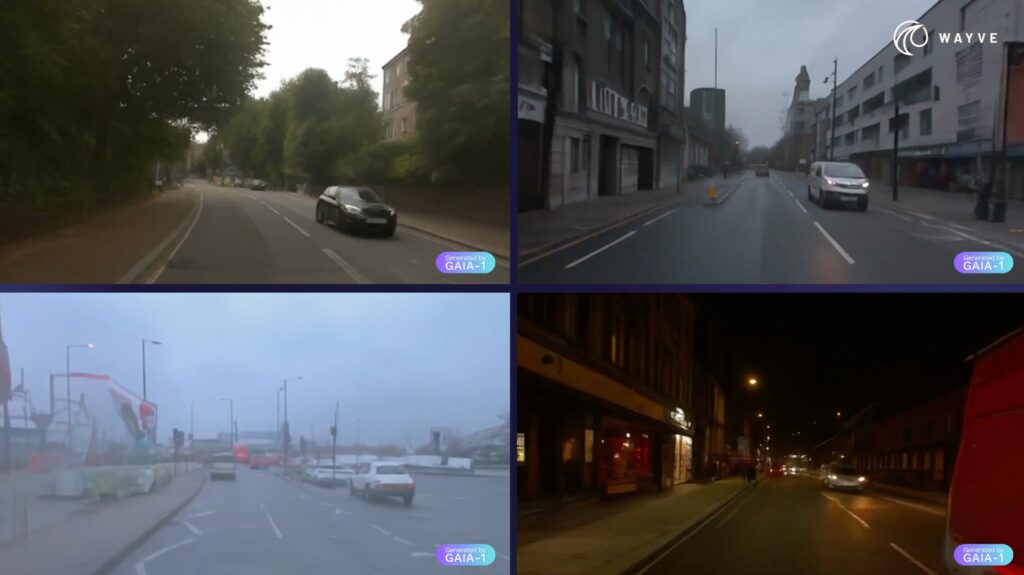Wayve, a leading developer of AI-powered self-driving technology, has released a technical report detailing its generative world model, GAIA-1 (Generative AI for Autonomy), previewed in June 2023. This research model was developed to enhance and accelerate the training of Wayve’s end-to-end AI software for autonomous driving.
Generative world models hold significant promise to advance deep learning for robotics applications such as self-driving cars. World modeling can help AI models learn general representations of how the world works and how to predict what might happen next. Like how people use mental models to make sense of the world and guide their actions, embodied AI systems could benefit from world models like GAIA-1. These models could help autonomous vehicles better understand their surroundings, allowing them to efficiently anticipate and plan their driving actions.
GAIA-1 is the first generative world model designed specifically for self-driving systems. It was introduced earlier this year and builds on Wayve’s research in future prediction, dreaming about driving, predicting in a bird’s-eye view and learning a world model. The nine-billion parameter model was trained on approximately 4,700 hours from Wayve’s corpus of UK driving data. It leverages video, text and action inputs to generate realistic driving scenarios while offering fine-grained control over ego-vehicle behaviour and scene features. GAIA-1 provides Wayve with a versatile and powerful tool to advance the training and validation of safer and more intelligent autonomous systems.
The uniqueness of GAIA-1 lies in its ability to merge the predictive capabilities of world models with the scalability and realism of state-of-the-art generative AI techniques. By bridging these two worlds, GAIA-1 combines the advantages of both approaches, creating simulated driving videos that closely mirror real-world conditions not only in visual realism but in their accurate representation of the behavioural patterns of the ego-vehicle and other dynamic elements within the scene. GAIA-1 has shown impressive accuracy in its ability to comprehend important concepts for driving, like distinguishing between cars, trucks, buses, pedestrians, cyclists, road layouts and traffic behaviors – setting it apart from other video generation models.
Wayve is currently testing its self-driving technology daily on UK roads and is undertaking Europe’s largest last-mile autonomous grocery delivery trial with the UK’s second-largest online supermarket, Asda. The company recently unveiled another first-of-its-kind AI model, LINGO-1, that uses natural language to comment on driving scenes and explain its decision-making. Developments like LINGO-1 and GAIA-1 pave the way to significant advances in the field of autonomy, which can help self-driving cars better understand and predict their surroundings. This could represent a significant leap forward in making their safe deployment a reality.
“I’m impressed by GAIA-1’s ability to offer precise control over dynamic driving and scene features, including the way other agents in the scene react to the vehicle that’s driving,” said Alex Kendall, co-founder and CEO of Wayve. “This future prediction capability makes GAIA-1 truly representative of real-world driving. The diverse array of driving videos we can generate with this model makes it ideal for research, training and validation of autonomous driving systems.
“But the significance of GAIA-1 extends beyond its generative capabilities. GAIA-1’s incorporation of world models represents a crucial step toward achieving autonomous systems that can understand, predict and adapt to the complexities of the real world. This holds immense promise for improving the safety and robustness of autonomous vehicles and their ability to handle diverse and dynamic environments.”
Yann LeCun, VP and chief AI scientist at Meta and Wayve investor, added, “I’ve been advocating the idea of world models and planning for many years, and Wayve’s GAIA-1 model is an impressive demonstration of how well this works in the context of autonomous driving.”


